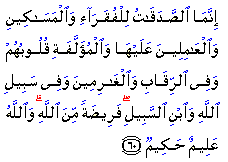Zakah, Community Service, Remembrance
Issue 545 » September 4, 2009 - Ramadan 14, 1430
Living The Quran
Al-Tawbah (Repentance)
Chapter 9: Verse 60
 Who to Give Zakah?
Who to Give Zakah?
"As-Sadaqat (here it means Zakat) are only for the Fuqara and Al-Masakin and those employed to collect the (funds); and to attract the hearts of those who have been inclined (towards Islam); and to free the captives; and for those in debt; and for Allah's Cause, and for the wayfarer; a duty imposed by Allah. And Allah is All-Knower, All-Wise."
The Quran describes eight categories of people who are to receive Zakah. Ahmad Sakr elaborated on these categories:
1. The poor (Fuqara)-this refers to someone who has no income
2. The needy (Masakin)-this is someone who for instance, may have a job, a house and a car, but their income is below the minimum requirement.
3. Employees of the Zakah. This category is sub-divided into the following:
a. the group of people who are social services workers who go into the community to evaluate who is Faqeer and Miskeen.
b. those who collect the Zakah money
c. the accountant of the Zakah money
d. investors who increase the share of the Zakah
e. the clerical worker or secretary who puts the files in order
f. those who will deliver Zakah to the ones who need it
g. the outside auditor.
4. Sympathizers
These are those people who might enter or who have already entered Islam. Anyone we feel are good friends or ours (non-Muslim or new Muslims) we give them a gift from the Zakah money.
5. To free slaves
Riqab is the term used to describe the group of people who are slaves. The Zakah money is used to free the slaves. Sakr stresses that Islam did not invent slavery, but it gradually abolished it.
6. For the Gharimeen-those who are in debt
Zakah money is used to pay off debts but these people are not living in luxury, they are living a normal life. For example, someone who has gone bankrupt because of job loss and is overloaded with debt.
7. Fee Sabeelillah (for the Cause of Allah)
This can be anything for the love of Allah. Sakr gave the following examples:
a. for the employment of a Daiyah, Imam, or religious teachers to do Dawa
b. building Islamic schools
c. building Muslim clinics and hospitals
d. providing money to young men who want to marry but cannot afford Mahr
e. to assist poor travelers
f. to establish water springs on streets for those walking or travelers
(please note, these last three things were done by Khalifa Umar ibn Abdul Aziz)
g. to defend Muslims who are under attack
h. For television, radio or newspaper project aimed at doing Dawa
i. to help someone publish a book for Dawa
j. to pay for the studies of a student..
8. Ibn as Sabeel
This refers to a traveler, for instance who has lost his wallet and has to get back to his home.
Sakr stresses that this has to be verified to see if this person is really telling the truth, since there has been at least one case of a man claiming to be a lost traveler in North America who has stolen thousands from Muslims claiming to be a traveler of this type.
Compiled From:
"Frequently Asked Questions about Zakat" - SoundVision.com
Understanding The Prophet's Life
Community Service
Rasulullah, peace be upon him, preferred to do most of his household work himself. He participated fully in community activities and shared responsibilities when he travelled.
Once, Rasulullah was traveling with his Sahaba (companions). In the evening the caravan stopped. They pitched their tents and began preparations for dinner. Everyone divided the various responsibilities, such as kindling the fire and slaughtering the animals for the meal.
A Sahabi told Rasulullah, "O Prophet of Allah, we are your companions and there are enough of us to care for the camp. You do not have to work. You should rest."
Rasulullah said, "No, I am no better than any other human being. I am one of you and I should participate in the work."
Then he chose the task of bringing wood for the fire. He walked out to the woods and returned with dry kindling. The Sahaba lit the fire and cooked dinner.
Rasulullah set an example for the community leader. In one of his traditions he advises the Ummah, "The leader of the community is their servant."
Compiled From:
Recorded in Al-Zarqani. "Stories of the Sirah (Vol. X)" -Abidullah Ghazi and Tasneema Ghazi, p. 11
Blindspot!
Remembrance
Remembrance gathers what has become dispersed, disperses what has become gathered, makes near what has grown remote and removes what has grown near.
It gathers together what has become dispersed within the servant: his heart, will and intention. For these to be separated, dispersed and dissipated is the worst of all torments, while in their union is happiness and life itself.
[Conversely], remembrance disperses that which has accumulated within the servant. Cares and woes, sadness and disappointment at not getting his share or at not getting what he seeks; greater and lesser sins and burdens all fall away, crumble and vanish.
Bringing nearer what is remote refers to the next world, which both the Devil and illusions render seemingly distant. For the servant who keeps to remembrance, it is as if he enters the next world and dwells there. When the next world is close to his heart, this one will grow distant; whenever that level is nearer to him, this one withdraws. And there is no way to this except through constancy in remembrance. And God is our helper.
Compiled From:
"The Invocation of God" - Ibn Qayyim al-Jawziyya, pp. 81, 82